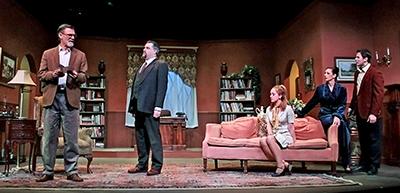The Hamptons Theatre Company's Surprising Whodunit

A wealthy novelist husband. A hot-to-trot stepmother. A ne’er-do-well son. A loaded gun. What could possibly go wrong?
This is the question asked by the playwright Bernard Slade in the Hampton Theatre Company’s production of “An Act of the Imagination,” currently running at the Quogue Community Hall through April 9. This twisty, surprising whodunit will satisfy fans of murder mysteries despite its occasional lack of narrative momentum. Viewers who can hang on through the draggier moments will be richly rewarded.
The play, set just outside London in the mid-1960s, is a classic British mystery in the style of Agatha Christie and Arthur Conan Doyle, though with a slightly nastier, post-modern sensibility. Arthur Putnam is a successful mystery writer who has just completed a new novel, the plot of which seems to echo events not only in his own life, but in the play we are watching (this is a play within a book within a play).
Is Arthur unfaithful, like the hero in his novel? He denies it, but his wife and editor aren’t so sure. Is someone trying to frame him for murder? Most definitely. Toss in a vain, money-sponging son and a mysterious woman with blackmail on her mind, and you have the makings of an enjoyably devilish night of theater.
Mr. Slade is also the author of “Same Time, Next Year,” which chronicled a couple who carry on an annual tryst for two decades. “An Act of the Imagination” is a more frivolous tale, though it does make a few stabs at profundity as Arthur tries to explain how authors cannibalize their own lives for material. Most audience members won’t find much nourishment in these metaphysical musings about the relationship between a writer and the imagination, but Mr. Slade’s talent for twisty plot points will have viewers surprised and occasionally gasping. There is even a sign as you enter the theater, warning that the play involves the simulation of weaponry. Yes, shots will be fired, and even though you know it’s coming you may find yourself flinching.
Although the actors’ English accents vary in verisimilitude under Edward A. Brennan’s direction, the cast is generally superb. Rebecca Edana, excellent in last year’s H.T.C. production of “Lost in Yonkers‚“ is very good as Arthur’s much younger wife, Julia. And Jesse Pimpinella is suitably creepy as the scheming son, Simon.
There is a draggy moment or two near the end of the first half (the play could probably be 15 minutes shorter), but then Meggie Doyle arrives as the blackmailing Brenda Simmons and livens things up considerably, bringing both energy and moxie to the potentially cliched role of the calculating floozy. And Matthew Conlon is absolutely outstanding as Arthur, the self-proclaimed “stodgy” author. Mr. Conlon alternates from absent-minded narcissism (can Arthur be losing his mind?) to lucid fury at finding himself the victim of a vicious plot. It’s hard to imagine this role performed with more range or complexity.
As for the plot, it’s no use to trying to fathom just exactly what is going on and with whom — even the most veteran of mystery fans will find their best guesses overturned.
Despite its protracted length, “An Act of the Imagination” is beautifully constructed and full of satisfying misdirections, though it is unclear why it feels the need to punctuate these moments with heavy-handed sound effects. As the climax nears and the plot goes into overdrive, the phrase “cue the thunder” begins to take on almost comic overtones.
Dana Marbury’s set, on the other hand, finds just the right tone for this prosperous literary family, in which all is perfect yet not quite right. So does most everything else in “An Act of the Imagination.” Its giddy immorality will have you feeling virtuous by comparison.
